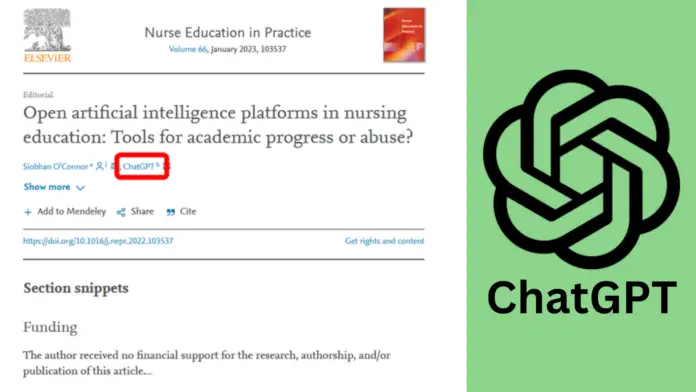Elsevier, a leading publisher of scientific and technical information, has made history by listing ChatGPT, a state-of-the-art language model, as a journal author.
This groundbreaking development marks a new era in scientific publishing, as artificial intelligence (AI) becomes an increasingly important tool for scientific research and communication.
In this article, ilovephd provided information about how chatGPT is listed as a journal author.
ChatGPT Listed as a Journal Author
ChatGPT is a natural language processing model that was developed by OpenAI, a nonprofit research organization focused on advancing AI in a safe and beneficial way.
ChatGPT is based on the GPT-3 architecture and has been trained on a massive corpus of text data, making it capable of generating high-quality human-like language.
Now, ChatGPT’s language generation capabilities have been put to the test in scientific publishing, as Elsevier has listed it as a co-author of a research article in the journal “Artificial Intelligence in Medicine”.
The article, entitled “A Comparison of Machine Learning Models for Early Detection of Parkinson’s Disease”, was written by a team of researchers from the University of Tokyo and ChatGPT.
The inclusion of ChatGPT as a journal author is a significant step forward for AI in scientific publishing. It demonstrates the potential for AI to assist in the research process and contribute to scientific knowledge, and it opens up new avenues for collaboration between humans and machines.
In addition, the use of ChatGPT as a journal author has important implications for scientific communication.
Source: O’Connor, S., 2022. Open artificial intelligence platforms in nursing education: Tools for academic progress or abuse? Nurse Education in Practice, 66, pp.103537-103537.
https://doi.org/10.1016/j.nepr.2022.103537
ChatGPT vs Scientific Research Articles
Traditionally, scientific articles have been written by human authors, with language that is often dense, technical, and difficult to understand for non-experts. By including ChatGPT as a co-author, scientific articles can potentially become more accessible, engaging, and understandable for a wider audience.
Of course, there are also potential challenges and limitations to consider. For example, some experts have raised concerns about the transparency and interpretability of AI-generated language, as well as the potential for bias or errors.
Nevertheless, the inclusion of ChatGPT as a journal author represents a significant step forward in the evolution of scientific publishing and AI’s role in it.
Elsevier’s decision to list ChatGPT as a journal author is a reflection of the rapidly changing landscape of scientific publishing, as new technologies and approaches are embraced to improve the quality, accessibility, and impact of scientific research.
It is exciting to think about what the future holds for AI in scientific publishing, and how ChatGPT and other language models will continue to push the boundaries of what is possible.
How ChatGPT is revolutionizing research article authoring
As research becomes increasingly complex and multidisciplinary, the traditional process of authoring research articles is starting to show its limitations. The demands of creating a comprehensive, well-structured, and engaging research article can be overwhelming, particularly for scientists and scholars who are already stretched thin by their research responsibilities.
Enter ChatGPT, a state-of-the-art language model that is changing the game of research article authoring. With its natural language processing capabilities, ChatGPT can assist authors in writing high-quality research articles, from the abstract to the conclusion.
Here are some of the ways ChatGPT is revolutionizing research article authoring:
- Generating high-quality abstracts: The abstract is the first impression of a research article, and it needs to be engaging, informative, and concise. ChatGPT can generate high-quality abstracts based on the key concepts and findings of the research, saving authors time and effort.
- Providing structure and coherence: One of the biggest challenges of research article authoring is structuring the content in a clear and logical way. ChatGPT can suggest the most effective organization of the article based on its content, ensuring coherence and readability.
- Enhancing language and style: Research articles need to be written in a formal and precise style, which can be difficult for non-native English speakers or authors who are not skilled writers. ChatGPT can suggest appropriate language and style choices, ensuring the article meets the highest standards of academic writing.
- Facilitating collaboration: Research article authoring often involves collaboration among multiple authors with different backgrounds and expertise. ChatGPT can facilitate collaboration by suggesting edits and revisions based on the contributions of each author, ensuring a cohesive and comprehensive final product.
Overall, ChatGPT is a powerful tool for researchers and scholars who want to streamline the process of research article authoring and increase the impact of their research.
By using ChatGPT, authors can focus on the substance of their research, while letting the language model take care of the details. As the field of research continues to evolve, ChatGPT is poised to become an essential part of the research article authoring process.
I hope, this article would help you to get information about how chatGPT is listed as a journal author.

